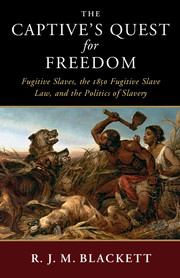 The Captive's Quest for Freedom
The Captive's Quest for Freedom 2 - The Law Does Its Work
from PART I - THE SLAVE POWER ASSERTS ITS RIGHTS
Published online by Cambridge University Press: 19 January 2018
Summary
Long before the passage of the Fugitive Slave Law, the enslaved chose to leave the places and the people they knew, in numbers that could only be guessed at, in search of the unknowns of freedom among strangers in black communities scattered throughout the North and in Canada. They created new lives for themselves among free blacks and other fugitive slaves in cities, towns, and rural hamlets. Those from the Shenandoah Valley of Virginia, for instance, found refuge in black rural settlements in Washington County, and another south of Meadville, Pennsylvania, as well as jobs in the booming economy of Pittsburgh. Those from the northern counties of Maryland headed for the relative safety and anonymity of Philadelphia, Harrisburg, and York. From the eastern districts of Maryland, Virginia, and North Carolina, they headed to such cities as New York, Boston, and New Bedford, Massachusetts, and places in between. They decamped from northern Kentucky to Cincinnati, and Columbus, Ohio, and further north to the small towns and cities that lined the Great Lakes from Chicago and Detroit in the west to Buffalo, Rochester, and Syracuse in the east. Others chose to stay closer to the places they knew in the relative safety of a black rural settlement with a strong Underground Railroad network near Ripley, Brown County, Ohio, just across the river from Kentucky. In 1850, there were reputed to be forty black settlements in the state. Settlements, some established by Quakers in eastern Indiana, drew slaves both from Kentucky and North Carolina. One historian has estimated that there were roughly sixty black settlements in the state by the outbreak of the Civil War. Some of these would disband after the passage of the law, only to be reestablished further north in the state and even further afield in Michigan, Wisconsin, and Canada. Slaves from Missouri headed for black rural settlements in western Illinois, such as the one at Rocky Fork near Alton and to Chicago further north. One distraught delegate to the Illinois State Constitutional Convention that passed a series of draconian laws banning blacks from entering the state pointed to a number of “little settlements” of blacks in the Egypt district of southern Illinois, an area notorious for its unwillingness to tolerate the presence of blacks, but in which, he remarked, fugitive slaves from Missouri found comfort and protection.
- Type
- Chapter
- Information
- The Captive's Quest for FreedomFugitive Slaves, the 1850 Fugitive Slave Law, and the Politics of Slavery, pp. 42 - 87Publisher: Cambridge University PressPrint publication year: 2018


